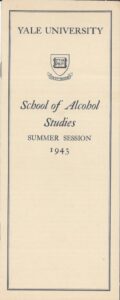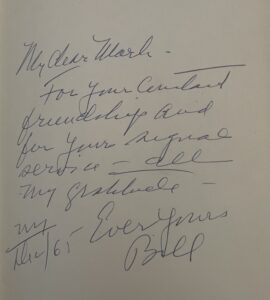
After Jellinek’s death in 1963, representatives of various national groups came together, including Alcoholics Anonymous, and established the Jellinek Memorial Fund to honor E. M. Jellinek, one of the greatest contributors to alcohol studies. Originally consisting of $1000 and a Bunky, a bronze casting of the head of Jellinek, the Jellinek Memorial Award has been honoring scientists who made significant contributions to the advancement of knowledge and understanding of alcoholism. William Griffith Wilson, better known as Bill Wilson or Bill W. has been the only individual in the history of the Jellinek Memorial Award who received it for non-scholarly achievements in 1972.
The award was presented posthumously to Bill W., a co-founder of Alcoholics Anonymous, who died in 1971, noted for his work in A.A. and in changing public attitudes toward alcoholism. On behalf of Wilson’s widow, Mrs. Lois Burnham Wilson, R. Brinkley Smithers accepted the award at the 30th Anniversary Banquet of the Rutgers Summer School of Alcohol Studies (SSAS), July 13, 1972. The ceremonial speech was given by Mark Keller, a longtime member of the SSAS faculty.
The Digital Alcohol Studies Archives is proud to share a copy of the speech Mark Keller delivered at the award ceremony, calling the event a day that everyone would remember. A trailblazer himself in many areas of alcohol studies, Mark Keller lists Bill W. and E. M. Jellinek as the most significant people in the field. He had paid tribute to Jellinek in many of his publications, for example, pointing out in the foreword of the Jellinek tribute volume that what Jellinek had started became “a world-embracing achievement of scholarship and scientific progress.” Coupled with “a boundless imagination and vision in recognizing what needed to be done,” as Keller puts it, Jellinek’s scientific approach was “inspiring and guiding capable people in doing it.” (Keller, 1970)
Bill W. showed up much earlier on Keller’s radar, in the mid-1930s, when Keller was working for Normann Jolliffe’s lab at the New York College of Medicine and in the Psychiatric Division of the Bellevue Hospital. As Keller often reminisced, one day there was a caller on the phone who wanted to talk to the doctor “who was reported to have discovered the chemical cure for alcoholism.” The doctor, Dr. Jolliffe, was out and Keller offered to listen to him and have Jolliffe call him back. During this conversation, Bill W. told Keller about the small group of alcoholics who “had banded together to help each other sober, and they were succeeding.” They were writing their stories in a book and hoped to publish it. Keller mentioned the caller to Dr. Jolliffe, referring to him as “another oddball,” but Jolliffe wanted to look into it. This was Keller’s first introduction to AA, three years before the publication of the Big Book. (Keller, 1972)

This early interaction was soon followed by the other important and lifelong connection Keller established, this time with E. M. Jellinek, again, through Dr. Jolliffe, as they had secured the $25,000 grant from the Carnegie Corporation to review the literature related to alcohol problems in 1939 and started to work on what later evolved into the Classified Abstract Archives of Alcohol Literature (CAAAL). Skeptical first about the Big Book, Jellinek nevertheless included it in CAAAL as one of the first items added to the collection.
Later, when both Keller and Jellinek moved on with their careers to the Department of Applied Physiology at Yale, the predecessor of the Section, then Center of Alcohol Studies, the three of them eventually got together in the early years of the Summer School of Alcohol Studies (SSAS).
 The six-week course started as an inclusive, on-site educational and training initiative that defined the field of alcohol studies for a long time. At the beginning, in 1943-1944, the program consisted mostly of lectures and discussions. Considering it important that SSAS students should learn about AA, Jellinek invited Bill W. as one of the first non-staff people to give a lecture, which, eventually, was made a sort of a grand finale of the school. His appearance and talk “did not at all seem anomalous in the academic atmosphere of the School of Alcohol Studies, ” as Keller remembers it in the obituary he wrote about Bill W. (M. K., 1972, pp. 186-187). Keller also calls Bill W.’s talk moving and unforgettable to those who heard him then.
The six-week course started as an inclusive, on-site educational and training initiative that defined the field of alcohol studies for a long time. At the beginning, in 1943-1944, the program consisted mostly of lectures and discussions. Considering it important that SSAS students should learn about AA, Jellinek invited Bill W. as one of the first non-staff people to give a lecture, which, eventually, was made a sort of a grand finale of the school. His appearance and talk “did not at all seem anomalous in the academic atmosphere of the School of Alcohol Studies, ” as Keller remembers it in the obituary he wrote about Bill W. (M. K., 1972, pp. 186-187). Keller also calls Bill W.’s talk moving and unforgettable to those who heard him then.
Bill W. is listed as William Wilson, Director of Alcoholics Anonymous as one of the lectures in 1943 and 1944 in the SSAS program brochure. Recorded in full, the Quarterly Journal of Studies on Alcohol published the lecture he gave in 1944 as part of the book Alcohol, Science and Society. Lecture number 29 is entitled “Fellowship of Alcoholics Anonymous,” presented by “W.W. (one of the founders).”
 Just like with Jellinek, Keller cherished his friendship with Bill W. for several decades. The volume, Alcoholics Anonymous Comes of Age, given to Keller by Bill W., with his warm words, is here to attest to their mutual respect.
Just like with Jellinek, Keller cherished his friendship with Bill W. for several decades. The volume, Alcoholics Anonymous Comes of Age, given to Keller by Bill W., with his warm words, is here to attest to their mutual respect.
References
- Current Events. (1972). Quarterly Journal of Studies on Alcohol, 33(4), 1149-1154.
- Keller, M. (1970). Tributes to E. M. Jellinek. In Popham, R. E. (Ed.) Alcohol and Alcoholism, pp. x-xvi. Toronto, Canada: University of Toronto Press.
- K., M. (1971). Bill W.—1895–1971. Quarterly Journal of Studies on Alcohol, 32(1), 186-187.
- Keller, M. (1972). Bill Wilson Bunky Award. Speech presented at the Jellinek Memorial Award, Keller Files. Center of Alcohol Studies Archives, Rutgers, The State University of New Jersey, Piscataway, NJ.